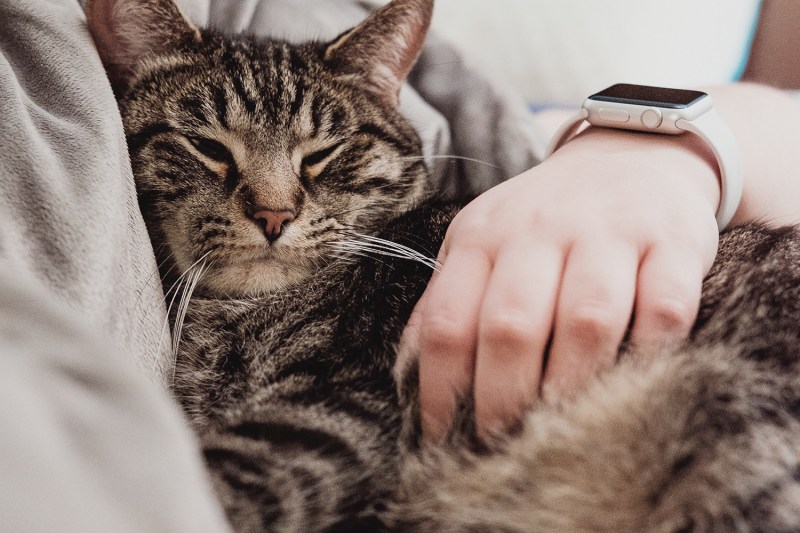If you voluntarily clicked on this article, we probably don’t need to convince you that pets are wonderful. Cat people, dog people, bunny people – heck, bearded dragon people – would all agree that caring for a living creature is immensely rewarding. But it can also be an effective form of therapy.
Though dogs are most commonly associated with emotional support roles, many animal species can provide a level of comfort to those who truly need it. In this article, we’ll outline how to define an emotional support animal (ESA), why you might benefit from one, how to choose the right ESA, how to qualify, and the rights and responsibilities of ESA handlers.

Before all that, a quick disclaimer: Recently, some for-profit enterprises have leveraged the laws governing emotional support animals (ESA) to make a quick buck. And, it seems, folks want what they have to offer. After all, if you can get official approval for an ESA, you can skirt some costs associated with having a pet.
In no way do we condone these activities. Technically, an ESA is not a pet – it is a source of therapy for those suffering emotional ailments. To take advantage of these laws for personal gain (and thereby cast doubt on the legitimacy of real ESA needs) is just plain wrong.
Service Animal vs. Emotional Support Animal
Let’s first make sure we’re all speaking the same language. The Americans with Disabilities Act (ADA) defines service animals and ESAs differently, making certain provisions for each class of critter.
The simplest way to separate these two is to remember that service animals are only dogs, while ESAs can be a variety of animals. To be more specific, a service animal is a dog that is “individually trained to do work or perform tasks for the benefit of an individual with a disability, including a physical, sensory, psychiatric, intellectual, or other mental disability,” according to the ADA. Some common service animals include Seeing Eye dogs, Hearing dogs, Psychiatric Service dogs, and Seizure Response dogs.

Under Title II and III of the ADA, an ESA or therapy animal is not considered a service animal. An ESA may have specialized training to assist its handler, but that isn’t required. Licensed medical professionals who recommend emotional support animals acknowledge that their patients could benefit from the companionship, but are physically capable of performing daily tasks without the assistance of these animals.
Why Bring Home an ESA?
Whether to relieve loneliness, depression, or anxiety, an ESA can play a critical role in improving the lives of afflicted individuals. Taking on a dependent animal will endow you with healthy responsibility that stops short of the commitment (financial and otherwise) to a fellow human. Yes, you’ll need to feed, pick up after, and medically care for your animal, but it won’t ask you for help with its homework or throw a tantrum when you need to rest.
An ESA provides comfort and, if necessary, distraction during times of emotional trial. To put it simply: it is there for you, not the other way around.
Choosing the Right Emotional Support Animal
Selecting the right ESA is an important decision, and is completely at your discretion. Any domesticated animal can qualify as an ESA, but consider how you’ll interact with your chosen companion. If you get a real boost out of watching a snake devour a mouse every day, great! However, if petting, training, and caring for, say, a cuddlier creature soothes your condition, go that route.

Also consider your budget. A dog is far more expensive than a hamster, especially when your pup needs medical care. Research extensively and think beyond the next few months of ownership. Ideally, your ESA will coalesce with your lifestyle, providing emotional relief during hardship – not additional stress.
How to Qualify
Though few qualify for a service animal, numerous individuals are advised to become the owner of an ESA as part of a cognitive therapy program. To get official approval for an ESA, a licensed mental health professional must certify your emotional disability via a signed, dated letter on the physician’s letterhead, accompanied by the medical professional’s license number, date, and place of issue.
You do not need to register your ESA with any organization, buy it a vest (if you could even find one that fits a bearded dragon), or get it any other official documentation. A letter from a treating mental health professional is all that’s required.
ESA Handler Rights and Responsibilities
Keep in mind that, like any pet, you are responsible for your ESA’s behavior. If you pick a fight-trained pit bull for company, you’ll be on the hook if it mauls your neighbor’s Chihuahua. Similarly, if your miniature horse isn’t housebroken, don’t expect your apartment complex to cover the cost of deep cleaning the carpets. Vaccines must be up to date, the animal must not develop a stench so foul that passing birds plummet from the sky … you get the idea.
Provided you adhere to these rules, there are a couple valuable provisions for you and your ESA. According to the Fair Housing Act (FHA), a landlord, owner, or building manager must make reasonable accommodations for your ESA. That means that even if your building doesn’t allow pets, your ESA must be permitted. There are a couple caveats to this: if the animal is extremely large (e.g. a horse), or if the presence of an ESA puts undue financial or administrative burden on the property owner, then the ESA can be denied.
The second provision falls under the Air Carrier Access Act (ACAA). Official ESAs are permitted to fly with their handlers in an airplane cabin, free of charge. While it’s certainly easier to accommodate a smaller ESA on your lap, you are also allowed to request a new seat with more room to fit a larger animal (dog) at your feet. Each airline has its own set of requirements, but all will request to see your signed physician letter.
If you’d like to learn more about pets, or need a guide on how to take care of your pet, PawTracks got you covered.




